chapter8CulturalinfluencesonContextsSectionOne大学英语跨文化交际教学课件
- 格式:ppt
- 大小:930.00 KB
- 文档页数:48
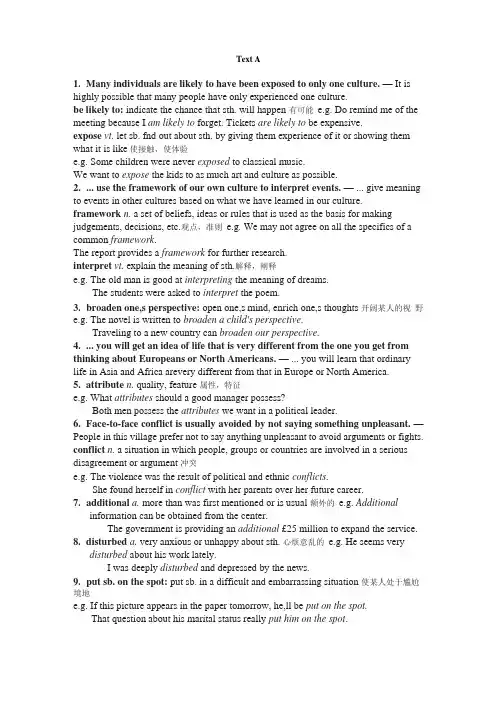
Text A1.Many individuals are likely to have been exposed to only one culture. — It is highly possible that many people have only experienced one culture.be likely to: indicate the chance that sth. will happen 有可能e.g. Do remind me of the meeting because I am likely to forget. Tickets are likely to be expensive.expose vt. let sb. fnd out about sth. by giving them experience of it or showing them what it is like使接触,使体验e.g. Some children were never exposed to classical music.We want to expose the kids to as much art and culture as possible.2.... use the framework of our own culture to interpret events. — ... give meaning to events in other cultures based on what we have learned in our culture.framework n. a set of beliefs, ideas or rules that is used as the basis for making judgements, decisions, etc.观点,准则e.g. We may not agree on all the specifics of a common framework.The report provides a framework for further research.interpret vt. explain the meaning of sth.解释,阐释e.g. The old man is good at interpreting the meaning of dreams.The students were asked to interpret the poem.3.broaden one,s perspective: open one,s mind, enrich one,s thoughts 开阔某人的视野e.g. The novel is written to broaden a child's perspective.Traveling to a new country can broaden our perspective.4.... you will get an idea of life that is very different from the one you get from thinking about Europeans or North Americans. —... you will learn that ordinary life in Asia and Africa arevery different from that in Europe or North America.5.attribute n. quality, feature 属性,特征e.g. What attributes should a good manager possess?Both men possess the attributes we want in a political leader.6.Face-to-face conflict is usually avoided by not saying something unpleasant. —People in this village prefer not to say anything unpleasant to avoid arguments or fights. conflict n. a situation in which people, groups or countries are involved in a serious disagreement or argument 冲突e.g. The violence was the result of political and ethnic conflicts.She found herself in conflict with her parents over her future career.7.additional a. more than was first mentioned or is usual 额外的e.g. Additionalinformation can be obtained from the center.The government is providing an additional £25 million to expand the service.8.disturbed a. very anxious or unhappy about sth. 心烦意乱的e.g. He seems verydisturbed about his work lately.I was deeply disturbed and depressed by the news.9.put sb. on the spot: put sb. in a difficult and embarrassing situation 使某人处于尴尬境地e.g. If this picture appears in the paper tomorrow, he,ll be put on the spot.That question about his marital status really put him on the spot.10.... conflict is usually followed by one of the people leaving the scene without explanation, confrontation, or argument. 一 ... if disagreement occurs, one of the people will choose to leave without bothering to explain, face or argue with each other. confrontation n. a situation in which there is an angry disagreement between people or groups who have different opinions冲突,对峙e.g. The issue has caused great tension between the two countries and could lead to a military confrontation.She wanted to avoid another confrontation with her father.11.As a result, many families dissolved with little ceremon y 一 This resulted in many families falling apart quickly and casually.as a result: therefore 结果,因此e.g. He had made good preparations for the competition. As a result, he won the first prize.Workers were not supportive of the new leader. As a result, a strike took place. dissolve vi. officially end 解散,结束e.g. Half an hour later, the party began to dissolve.All of these will dissolve into nothingness.12.Throughout the world, religion governs the lives of many people. 一 All over the world, religion plays a dominant role in many people,s lives and controls the way they live their lives.govern vt. control or influence the way that sth. happens, functions, etc.控制,支配e.g. The universe is governed by the laws of physics.Prices are very much governed by market demand.13.However, the extent to which this is true varies enormously from culture to culture. 一 The degree that religion can influence many people,s lives is different from one culture to another.vary from ... to ...: different from one another 各不相同e.g. In this company, salary scales vary from one position to another.The cost of a hotel room varies from season to season.14.frequently ad. happening very often频繁地,屡次地e.g. Buses run frequently between the city and the airport.Limestone (石灰石)was frequently used as a building material.15.discharge vt. release force or power 放(电)e.g. It can,t discharge electricity if it,s not connected properly.Lightning is caused by clouds discharging electricity.16.spiritual a. relating to the spirit rather than to the body or physical things 精神的e.g. Painting helps fill a spiritual need for beauty.We're concerned about your spiritual welfare.17.Illness is not considered a major problem; instead it is viewed as a spiritual event.——When people fall ill, they tend to think that their soul need to be cleansed rather than there is something wrong with their body.18.Traditional healing is widely used in Africa than is modern medicine and the obvious question is “why?”. —In Africa, traditional medical treatments are preferredover modern medicine, and the question that readers would most likely ask is why. healing n. the process of becoming or making sb./sth. healthy again治疗,康复e.g. Dogs were also associated with healing in the ancient world.This can promote the healing of the wound.19.derive ... from: develop or obtain sth. from sth. else 源于,从 .. 中获得e.g. This word is derived from Latin.He derived great pleasure from painting.20.inhabit vt. live in a particular place居住在,栖居于e.g. The woods are inhabited by many wild animals.I have no idea what sort of people inhabit the area.21.It thus is up to a traditional healer, who has the abilit y to “control” the spirits.—It is the responsibility of the person good at using traditional healing methods to make the spirits feel at ease.be up to: be the responsibility of sb., be decided by取决于……的,须由……决定的e.g. It is up to the manager to make the final decision whether to fire him or not.When you cut the grass is up to you.22.Do not look down on these healers; they are by no means ineffective — Do not take these healers lightly, because the methods they use are effective.by no means: definitely not 并不,绝不e.g. By no means will she go out with him.I will by no means trust a guy like him.ineffective a. not having any effect 无效果的e.g. The chemical was almost totally ineffective in killing the weeds.Various drugs have proved ineffective against the virus.23.award vt. officially give sb. a prize or money to reward them for sth. they havedone颁奖e.g. The judge awarded me the first prize.A Nobel Prize was awarded to Walksman in 1952.24.extensive a. covering a wide range of details, ideas, or items广泛的,全面的e.g.Extensive research has been done into this disease.His knowledge of music is extensive.25.classify vt. decide which group sb. or sth. belongs to 将.. 分类,将... 归类e.g. In law, beer is classified as a food product.Families are classified according to the father,s occupation.26.systematic a. done according to a system or plan, in a thorough, efficient ordetermined way 系统的e.g. They went about their business in a systematic way.There is a systematic approach to solving the problem.27.African healers learn about plant attributes and uses from their teachers, whoin turn learned from traditions developed over 1,000 years of trial and error.— African traditional healers learn about the qualities, features and uses of plants from their teachers; whereas their teachers learned about these from traditionsachieved through over 1,000 years of repeated experimentstrial and error: a way of achieving an aim or solving a problem by trying a number of different methods and learning from the mistakes 反复试验e.g. It requires a process of trial and error before a new drug goes into production.She feels that raising her children has been a matter of trial and error.28.occasional a. happening or doing sth. sometimes but not ofen 偶然的e.g. He made occasional visits to London.He works for us on an occasional basis.29.acquire vt. gain sth. by your own efforts, ability or behavior得到,获得e.g. He spentyears acquiring his skills as a surgeon.Elsie has acquired a good knowledge of Chinese after studying in this university for half a year.Text B1.diverse a. very different from each other and of various kinds不同的,多种多样的e.g. There is a diverse range of opinions on the issue.Linguistics embraces a diverse range of subjects such as phonetics and stylistics. 2.dominate vt. control or have a lot of influence over sb./sth.支配,控制e.g. He refuses to let others speak and dominates every meeting.They work as a group — no one is allowed to dominate.3.modify vt. make small changes to sth. in order to improve it and make it more suitable or effective 修改e.g. The club members agreed to modify their recruitment policy.The software we use has been modified for us.4.at length: in detail 详尽地e.g. I plan to revisit this topic at length in the next few articles.She talked at length about the problem.5.English copes with concepts such as contract deadlines and stock futures (Zulu doesn't)b ut our language is seen as poverty-stricken and inadequately descriptive by Africans and Amerindians whose languages abound in finely wrought, beautifully logical descriptions of nature, causation, repetition, duration, and result. — In English, we have developed a rich vocabulary for modern business, which the language of Zulu lacks. However, in the eyes of the Africans and Amerindians, compared to their languages, English seems to be poorer in vocabulary and does not provide enough words for daily use. Their languages can give detailed description about nature, about causes and effects, about events that happen from time to time, about time, and about outcomes.cope with: deal with 处理,应对e.g. He can cope with the present situation.To cope with these data, hospitals bought large mainframe computers. descriptive a. giving a description of sth. 描述的e.g. General data is analyzed by descriptive analysis.The essay begins with a richly descriptive introductory chapter.abound vi. be present in large numbers or in great quantity富裕,充满e.g. Mistakes abound on every page.Apples abound here all the year round.6.persist vi. continue to do sth., although other people oppose it 坚持e.g. If he persists in asking awkward questions, then send him to the boss.The government is persisting with its ambitious public works programme.7.retreat vi. move away from sb./sth.后退e.g. Attacks by enemy aircrafts forced the tanks to retreat from the city.When she came towards me shouting, I retreated behind my desk.8.indicate vt. show that sth. exists or is true 表明e.g. Please indicate which free gif you would like to receive.Our survey indicates that one in four children is bullied at school.9.vibrate vi. shake quickly and continuously with very small movements摆动,震动e.g. The whole station seemed to vibrate as the express train rushed through.His voice vibrated with anger.10.•・• he got to 39 without even raising a s—eat it did not take him much effort to com e up with 39 words of “green” in Zulu.11.evident a. easy to see, notice, or understand 显然的,明显的e.g. It is evident that he is not equal to the job.It has now become evident to us that a mistake has been made.12.adopt vt. start to use a particular method or show a particular attitude towards sb./sth.采用,采取e.g. It was a most fruitful discussion, with both sides agreeing to adopt a common policy.Since our research has not produced any answers to this problem so far, we need to adopt a different approach to it.13.Just as seeing with two eyes gives us stereoscopic vision, and a sense of depth, thinking in two different languages gives us added dimensions of reality. — Using two eyes together enables us to see the world in three dimensions (i.e., width, length and depth). Similarly, being able to speak more than one language also broadens our mind with different world views.14.striking a. unusual or interesting enough to be easily noticed 显著的,不同寻常的e.g. The most striking feature of those statistics is the high proportion of suicides.We observe a striking shift away from a labor theory among all mainline economists.15.observable a. capable of being seen or noticed看得见的,观察得到的e.g. Mars is too faint and too low in the sky to be observable.Judgment is based on observable phenomena and uninfluenced by emotions or personal prejudices.16.primitive a. belonging to a very simple society with no industry, etc. 原始的e.g. Primitive humans needed to be able to react like this to escape from dangerous animals.It is a primitive instinct to flee a place of danger.17.be awake to understand a situation and its possible effects注意到,意识到e.g. A pilot must be awake to changes in the weather.You need to be fully awake to the danger of leaving your belongingsunattended while traveling alone.18.reverse opposite to what is usual or to what has just been stated 相反的e.g. Thewrong attitude will have exactly the reverse effect.Can you say the alphabet in reverse order?。
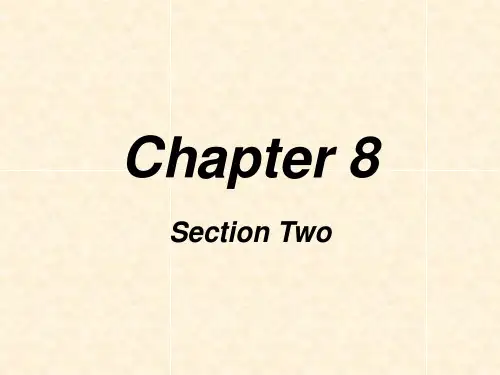
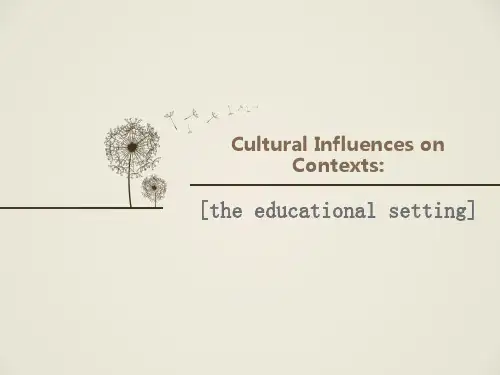
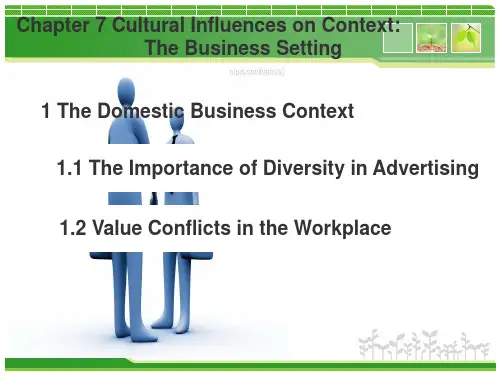
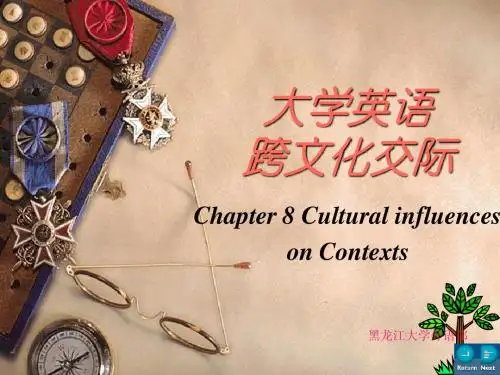
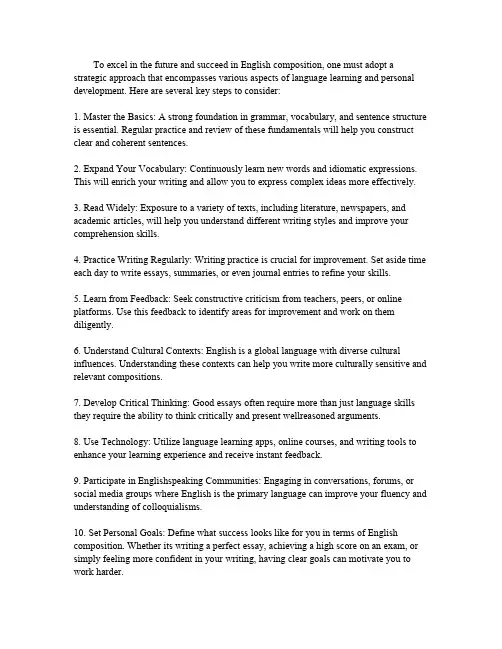
To excel in the future and succeed in English composition,one must adopt a strategic approach that encompasses various aspects of language learning and personal development.Here are several key steps to consider:1.Master the Basics:A strong foundation in grammar,vocabulary,and sentence structure is essential.Regular practice and review of these fundamentals will help you construct clear and coherent sentences.2.Expand Your Vocabulary:Continuously learn new words and idiomatic expressions. This will enrich your writing and allow you to express complex ideas more effectively.3.Read Widely:Exposure to a variety of texts,including literature,newspapers,and academic articles,will help you understand different writing styles and improve your comprehension skills.4.Practice Writing Regularly:Writing practice is crucial for improvement.Set aside time each day to write essays,summaries,or even journal entries to refine your skills.5.Learn from Feedback:Seek constructive criticism from teachers,peers,or online e this feedback to identify areas for improvement and work on them diligently.6.Understand Cultural Contexts:English is a global language with diverse cultural influences.Understanding these contexts can help you write more culturally sensitive and relevant compositions.7.Develop Critical Thinking:Good essays often require more than just language skills they require the ability to think critically and present wellreasoned arguments.e Technology:Utilize language learning apps,online courses,and writing tools to enhance your learning experience and receive instant feedback.9.Participate in Englishspeaking Communities:Engaging in conversations,forums,or social media groups where English is the primary language can improve your fluency and understanding of colloquialisms.10.Set Personal Goals:Define what success looks like for you in terms of English composition.Whether its writing a perfect essay,achieving a high score on an exam,or simply feeling more confident in your writing,having clear goals can motivate you to work harder.11.Stay Updated with Language Trends:Language is dynamic,and staying current with new words,phrases,and usage can make your writing more contemporary and engaging.12.Experiment with Different Genres:Trying your hand at different types of writing, such as descriptive,narrative,persuasive,and expository,can help you become a more versatile writer.13.Cultivate Creativity:Dont be afraid to express your unique voice and ideas.Creativity can set your writing apart and make it more memorable.14.Manage Time Effectively:Learning to manage your time well will allow you to dedicate enough time to each aspect of your English composition preparation.15.Stay Motivated:Keep your end goal in sight and remind yourself why you want to excel in English composition.This motivation can help you push through challenges and maintain a positive attitude towards learning.By integrating these strategies into your learning routine,you will be well on your way to winning in the future of English composition.Remember,success in language learning is a journey that requires patience,persistence,and a commitment to continuous improvement.。

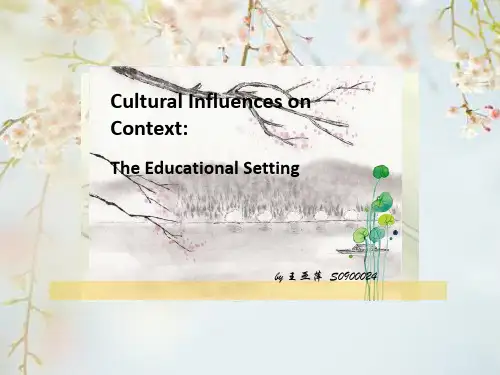
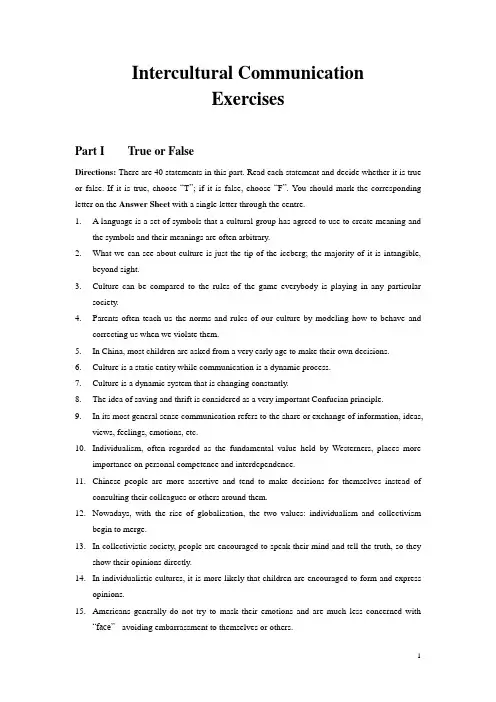
Intercultural CommunicationExercisesPart I True or FalseDirections: There are 40 statements in this part. Read each statement and decide whether it is true or false. If it is true, choose “T”; if it is false, choose “F”. You should mark the corresponding letter on the Answer Sheet with a single letter through the centre.1. A language is a set of symbols that a cultural group has agreed to use to create meaning andthe symbols and their meanings are often arbitrary.2.What we can see about culture is just the tip of the iceberg; the majority of it is intangible,beyond sight.3.Culture can be compared to the rules of the game everybody is playing in any particularsociety.4.Parents often teach us the norms and rules of our culture by modeling how to behave andcorrecting us when we violate them.5.In China, most children are asked from a very early age to make their own decisions.6.Culture is a static entity while communication is a dynamic process.7.Culture is a dynamic system that is changing constantly.8.The idea of saving and thrift is considered as a very important Confucian principle.9.In its most general sense communication refers to the share or exchange of information, ideas,views, feelings, emotions, etc.10.Individualism, often regarded as the fundamental value held by Westerners, places moreimportance on personal competence and interdependence.11.Chinese people are more assertive and tend to make decisions for themselves instead ofconsulting their colleagues or others around them.12.Nowadays, with the rise of globalization, the two values: individualism and collectivismbegin to merge.13.In collectivistic society, people are encouraged to speak their mind and tell the truth, so theyshow their opinions directly.14.In individualistic cultures, it is more likely that children are encouraged to form and expressopinions.15.Americans generally do not try to mask their emotions and are much less concerned with“face” - avoiding embarrassment to themselves or others.16.In low-context culture, much information is implied in the context.17.Most cultures contain both high-context characteristics and low-context characteristics, butusually there is a clear tendency toward one end of the continuum or the other.18.Conversations in a low-context culture tend to be clear, to the point, and more explicit, withlow dependence on the use of nonverbal codes.19.One reason for the indirect and subtle nature of the low-context communication is people’sgreat concern over “face”.20.The notions of equality lead Americans to be quite informal in their general behavior and intheir relationships with other people.21.Americans are generally more concerned about history and traditions than Chinese.22.For most Americans, voluntary idleness often is seen as a severely threatening and damagingsocial condition.23.For most Americans, work represents a cluster of moral and affective conditions of greatattractiveness.24.It is very common in the West to ask someone how much they paid for a particular item.25.In the individualistic culture, the interest of the individual prevails over the interests of thegroup.26.All cultures require and value politeness, but the ways in which politeness is achieved mayvary significantly.27.The Chinese way of showing concern is usually appreciated by the Westerners.28.Chinese people give more compliments in daily life than Americans.29.Americans tend to be self-effacing in their compliment responses.30.Sometimes the Chinese way of showing modesty may be considered as fishing forcompliments.31.Chinese hospitality toward the Westerners is always greatly appreciated.32.In past-oriented cultures, there is a strong belief that the past should be the guide for makingdecisions.33.People, who are future-oriented, consider how much they may earn in the future and decidethe expenditure.34.Chinese TV and radio broadcasters speak faster than their American counterparts.tin American, African, Arab and most Asian cultures are M-time cultures.36.Chinese people tend to talk with those opposite them rather than those seated or standingbeside them.37.Euphemism means the act of substituting a mild, indirect, or vague term for one considered harsh,blunt, or offensive.38.Honeymoon period is the first period of the culture adaptation where everything is new andexciting.39.Stereotype is assuming that a person has certain qualities (good or bad) just because the person is amember of a special group.40.Ethnocentrism refers to negatively judging aspects of another culture by the standards ofone’s own culture.Part II Language Appropriacy and AccuracyDirections: There are 50 statements or questions in this part. Each has a part underlined which describes a verbal or nonverbal behavior in intercultural interaction. Read each statement or question and decide whether the underlined part is appropriate or inappropriate. If it is appropriate, choose “A”; if it is inappropriate, choose “I”. You should mark the corresponding letter on the Answer Sheet with a single letter through the centre.1.When the guests arrive, Western hosts or hostesses usually say, “Thank you for coming!”2.You lent money to an American generously, and said, “Don’t mention it again. You don’thave to pay me back.”3.On a cold winter day Wang Ping met Professor Brown on his way to the library. Wang saidto him: “It’s rather cold. You’d better wear more clothes.”4.In a Western meal, you’re offered a second helping, but you have already had enough. Yousay: “That is delicious, but I've already had plenty, thanks.”5.In a factory, Li, the guide, is interpreting for a group of foreign guests. When they havefinished visiting one workshop, he would like the group to follow him to the next workshop.He says: “Follow me!”6.On the way to the school cinema, Li saw Professor Blake walking to the cinema, too. Liasked: “Are you going to the film?”7.Jack phones Jane’s office. Jack: “Hello, I’d like to speak to Jane, please.” Jane: “This isJane speaking.”8.In America, a man was trying to make his way through the gangway (过道) of a crowdedtrain. The way to his seat was blocked by a lady carrying several packages. He wanted to ask her to make a way for him, saying, “Excuse me. Make a way please.”9.Your friend’s mother, Mrs. Keeler, asked if you would like something to eat. You refusedpolitely: “No, thanks. I’ve just had lunch.”10.In London, you want to go to the Heathrow Airport by taxi, you say to the taxi driver:“Excuse me, would you possibly take me to Heathrow airport?”11.Simon, from America, taught English in a Chinese university, One day, the director of theEnglish Department informed Simon that he planned a journey to the nearby mountains.Simon said, “Sorry, I have a plan this weekend.”12.Mrs. Brown, in her late forties, came to lecture, wearing a new dress. One of her studentssaid to her: “You look nice and younger wearing this dress.”13.Patrick is sitting in a car with some friends. He has just asked if anyone minds him smoking.One of the friends in the car, Gillian, is allergic to smoke. She says: “Would you mind if I say no, Patrick?”14.Betty is a foreign student in China. She has met Peng Fei. Betty: “I was told that you wonthe 100-metre race in the all-city track meet this morning. Congratulations!” Peng:“I can’t say I did well this morning.”15.Xu Cheng happened to meet Jones at the bank when Jones was withdrawing money. Xusaid jokingly to him: “You’re really a millionaire.”16.You have spent an afternoon with your foreign teacher, Mr. Good. You have just got to go.Mr. Good: “Do drop around and visit us some time.” You: “Thank you, I will.”17.You address Jason Douglas, who is a lawyer, as “Lawyer Douglas”.18.You are a guest in a British or American friend’s home. Your friend asks if you would likesomething to drink. You really would like a drink. You say: “Yes, that would be lovely.”19.Yang Yang invited a Canadian friend, Julia, to her home for a meal. The dinner was readyand they were sitting at the table. There were so many dishes and they all looked delicious.Yang Yang said, “I’m sorry I’m not a very good cook and have just prepared so little.”20.Wang Lin called at one of his foreign friend’s house. He was really impressed by thebeautiful curtains made by his friend’s wife. He said to her: “Well, I didn’t expect you could make such pretty curtains.”21.Li Ming had something to tell Mr. Smith, the head of the department, so he went to hisoffice, entered it and said to him: “Can I have a word with you, Mr. Smith?”22.Li Hua invited an American friend, Ann, to his home. After Ann entered the room, Li Huasaid, “My room is very small and untidy. Please sit down and have a cup of tea. You must be tired.”23.Mary came to Zhang Mei’s birthday party and brought her a present wrapped in a nice box.Zhang Mei unwrapped the box in M ary’s presence and praised the present.24.Dr. Jones, your supervisor, telephoned to invite you to have dinner with his family. Youreplied: “Thank you. All right. I’ll try to come.”25.If you have a question to ask your foreign teacher of English, you may say goodbye to himand leave immediately after you have got the answer and expressed your gratitude.26.Dr. Smith, over 60, invited Li Bing to his birthday party. Li Bing brought him a China godof longevity as a present.27.When you want to compliment your English f riend’s new coat, you can say: “I like yournew coat.”28.If you are invited to dinner by one of your English-speaking friends, you may bring thehostess some fruit as a present.29.In English speaking countries, if one touches another person accidentally, he or she usuallymakes an apology.30.When you are eating with an English friend, you wish him: “Good appetite!”31.Mrs. Godwin was about the same age as Li Ming’s grandmother, so Li called her“Grandma.”32.If you don’t quite understand a native speaker of English and therefore want him to repeatan utterance, you say: “I beg your pardon, please.”33.Liu Hui recently moved to Los Angeles as a sales representative for a company. It’s earlyDecember and Liu knows this is the season many businesses give gifts to their clients. Liu buys a bottle of perfume for one of his client, Ann, and has it wrapped in red paper34.When you break a plate in one of your friend’s house, you say: “I’m awfully sorry, but Iseem to have broken a plate.”35.The best answer to the invitation “You really must come and see us one of these days.” maybe “Thank you very much. I love meeting English people.”36.The appropriate answer to the question “Who’s that crossing the street?” is “She’s Mary.”37.In public places, when a smoker says to you “Would you mind if I smoke?” You mayanswer: “Yes, please.”38.One of your foreign friends gives you a gift. Friend: “Here is a little something for you. Ihope that you like it.” You: “No, no. I really can’t accept it.”39.In America, people often fall in chairs, put their feet on their desks, sit on the carpeted floor,or slouch when they stand.40.One American friend invited a visiting scholar from China to watch a movie. America:What kind of movie do you like? Chinese: I don’t care. It’s up to you. Any movie you like will be fine.41.Mr. Green’s secretary, Pat Kent, went to the airport to meet Mr. Barnes for her boss. MissKent: “Excuse me, would you be Mr. Barnes?”42.If you study as a graduate student in the U.S.A., you should always try to avoid telephoningyour American classmates at sometime later than 11 p.m. unless there is an emergency. 43.In America a Chinese praised one of his colleagues, “Your skin is very white!”44.If you are a male and introduced to an English speaking lady, you do not take the initiativein shaking hands unless she holds out her hand first.45.Li Ming, a Chinese high school English teacher, met his American friend, Sunny, atTian’anmen Square. After greeting and chatting for a while. Sunny said. “Nice meeting you.” The Chinese teacher continued talking.46.In western countries, when you feel ill and want to go and see a doctor, it is good idea tomake an appointment before you go.47.In America, when one person gets in an elevator with another person already in the elevator,they exchange a brief smile.48.In America, in public speaking, a speaker reads a speech instead of looking at and talking tohis audience.49.Western mothers usually like Chinese to touch their babies or small children.50.In U.K., using the “V”sign to mean “victory”, you can do it with the palm facing outwardsor inwards.Part III TranslationDirections: Give the Chinese equivalents of the following expressions. Please write your translation on the Answer Sheet.1.early bird 早起或者早到者2.big bug 大人物3.fat cat 事业成功者4.lucky dog (bird) 幸运儿5.top dog 头领6.white elephant 无用的东西7.night owl 夜猫子8.black sheep 害群之马9.turn chicken 胆怯起来10.talk horse 吹牛11.play the peacock 沾沾自喜12.cry wolf 愚弄他人;发假警报13.drink like a fish 牛饮14.tread upon eggs 如履薄冰15.fish in the air 水中捞月16.rain cat s and dogs 大雨倾盆17.flea market 跳蚤市场(旧货市场)18.crocodile tears 假慈悲19.as wet as a drowned rat 湿得像落汤鸡20.as strong as a horse 壮如牛21.as timid as a hare 胆小如鼠22.as stupid as a goose 蠢得像猪23.like a cat on hot bricks 热锅上的蚂蚁24.the apple of somebody’s eye 掌上明珠25.red light district 红灯区; 色情场所26.catch sb. red-handed 当场抓获27.red rag 让人生气的东西28. a red letter day 节假日; 纪念日29.to be in the red 亏损; 负债; 赤字30.yellow ribbon 黄丝带(表示欢迎归来)31.yellow dog 卑鄙小人32.yellow looks 尖酸多疑的神情33.blue film 黄色电影34.in a blue mood 情绪低落35.white lie不怀恶意的谎言36.grey hair 白头发37.black tea 红茶38.brown sugar 红糖39.green-eyed 眼红的;嫉妒的40. a green hand 生手,易上当受骗的人41.green goods 新鲜货42. a green old age 老当益壮43.shoe rebuilder 修鞋匠ndscape engineer 园林工人45.sanitation engineer 清洁工46.senior citizens 老人47.Spend money like water. 挥金如土48.Haste makes waste. 欲速则不达。
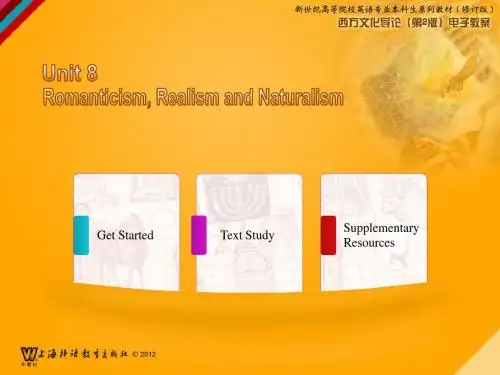

Chapter VI Culture’s Influence on PerceptionⅠTeaching Objectives1. To identify Hofstede’s cultural dimensions and cultivate students to be able to understand thevarious implications of cultural values for international communication2. To identify how culture affects sensing3. To identify the process of human perception4.To identify the distinction between high and low context culturesⅡLeading inⅢT eaching ProceduresStep1Have students look at the following lead-in pictures:Ask students warming-up questions:What can you see in these pictures?What kind of ability do you employ to identify these pictures?Step26.1SensingGeneral IntroductionSensation is the neurological process by which people become aware of their environment. Of human senses, sight, hearing, smell, taste, and touch are the most studied.The Human Information Receptor People’s Senses and Their LimitationsTactile StimuliOlfactic Stimuli(Smell of exhaustfumes)Auditory Stimuli’s police whistle)Tactile Stimuli(other pedestrian bumps into you)to you)Auditory Stimuli(car horns)Visual Stimuli(color ofstoplight)Visual Stimuli(officer directingTaste StimuliTaste Stimuli(flavor of bitter)e. TouchTouch may simply be considered as one of five human senses; however, when a person touches something or somebody, this gives rise to various feelings. Thus the term "touch" is actually the combined term for several senses.Effects of Culture on SensingDuring intercultural communication, many of the stimuli come from the cultural, microcultural, andenvironmental context.No two of us can assume that our sensations are the same. The routefrom stimulus to sensation is in part conditioned by culture.Stinky tofu (Strong-smelling preserved bean curd) is disfavored by quite a large number of people,however, it is favored greatly by people in the south, esp. in Hunan Province.6.2 PerceivingThe Process of PerceptionThe process of perception can be divided into three stages: selection, organization, and interpretation. a. SelectionThe first step is selection. Within their physiological limitations, people are exposed to more stimuli than they could possibly manage.b. OrganizationThe second step is organization. Along with selecting stimuli from the environment, peoplemust organize it in some meaningful way.What are they doing?Culture can affect the process of perception when communication takes place. When communicators come from different cultures, however, not only the meanings, but also the mental categories are very different.Cross-cultural Difference in Sensation and PerceptionThere are four reasons for which people differ across cultures in their ability to gather incoming information:a. Conditions of the physical environmentb. Indirect environmental conditionsc. Genetic differencesd. Cultural differences in how people interact with their environment 6.3 High versus Low ContextHave students listen tothe lead-in case High-context Culture and Low-context culture .Ask students warming-up questions:● Why did the Chinese doctor feel unhappy and distressed?● What are the differences in ways of expression between the Chinese doctor and the Canadiandoctor?● Are the differences in their ways of expression and their communicative conflicts caused, tosome extent, by the different cultures in which they were brought up? ⏹ High-Context CultureCultures in which little of the meaning is determined by the context because the message is encoded in the explicit code are labeled low-context culture.An American standing on chair in restaurantgiving speech at his leaving his hometown⏹Low-Context CultureCultures in which less has to be said or written because more of the meaning is in the physical environment or already shared by people are labeled high-context culture.Tea Ceremony⏹Comparisons Between High-Context Culture and Low-Context CultureIn low-context cultures, verbal messages are elaborate and highly specific. Logic and reasoning are expressed in verbal messages; in high-cultures, most of the information is either in the physical context or internalized in the person.Case Analysis: Chinese Style—Nonverbals●What are the differences in communication styles between the Chinese old scholar and thewestern traveler?●Can you imagine some problems or communicative barriers caused by differentcommunication styles of high-context and low-context culture.Do you think they will have communication problemsdue to their different communication styles.Step3Distinguishing between High-context Culture and Low-context Culture:辨别高语境文化和低语境文化:教师通过辨别不同的文化现象引导学生了解高语境文化和低语境文化。
对文化有很大影响英语作文Culture plays a significant role in shaping our beliefs, values, behaviors, and interactions with others. It influences our perceptions of the world, our traditions,and even our language. In this essay, I will discuss the impact of culture on individuals and societies.Firstly, culture shapes our beliefs and values. Our cultural background determines what we consider right or wrong, good or bad. For example, in some cultures, it is customary to greet others with a bow, while in others, a handshake is the norm. These cultural norms are ingrainedin us from a young age and influence how we interact with others.Secondly, culture influences our behaviors. Different cultures have different social norms and expectations for how individuals should act in various situations. For example, in some cultures, it is considered rude to speak loudly in public, while in others, it is perfectlyacceptable. These cultural norms guide our actions and help us navigate social interactions.Furthermore, culture plays a role in shaping our traditions. Every culture has its own unique customs, rituals, and celebrations that are passed down from generation to generation. These traditions help to create a sense of identity and belonging within a community. For example, the Chinese New Year is a time for families to come together, eat traditional foods, and celebrate the start of a new year.Additionally, culture influences our language. Language is a key component of culture and reflects the values, beliefs, and customs of a society. Different languages have different words and expressions that convey unique cultural meanings. For example, the concept of "schadenfreude" in German, which refers to taking pleasure in someone else's misfortune, does not have a direct equivalent in English.In conclusion, culture has a profound impact on individuals and societies. It shapes our beliefs, values,behaviors, traditions, and language. By understanding and appreciating different cultures, we can foster greater understanding, empathy, and respect for others. Culture is a rich tapestry that adds depth and diversity to our world.。
Art is a diverse range of human activities involving the creation of visual,auditory, or performing artifacts artworks that express the creators imagination,conceptual ideas, or technical skill,intended to be appreciated primarily for their beauty or emotional power.Here are some key aspects to consider when writing an essay about art:1.Definition of Art:Begin by defining what art is and its various forms,such as painting, sculpture,music,dance,theater,and digital media.2.Historical Context:Discuss the evolution of art from ancient civilizations to the modern era,highlighting significant periods like the Renaissance,Baroque,Romanticism, Impressionism,and Contemporary Art.3.Cultural Significance:Art is deeply rooted in culture.Explore how art reflects and shapes cultural values,beliefs,and identity across different societies.4.Artistic Expression:Delve into the personal and emotional aspects of art.Discuss how artists use their work to convey emotions,tell stories,and comment on society.5.Techniques and Styles:Describe the various techniques and styles used by artists,such as realism,abstract,impressionism,and expressionism.Explain how these techniques contribute to the overall impact of the artwork.6.Art Movements:Discuss influential art movements and their philosophies,such as Cubism,Surrealism,Abstract Expressionism,and Pop Art.7.The Role of the Viewer:Art is subjective and open to interpretation.Discuss the role of the viewer in the appreciation and understanding of art.8.Impact on Society:Explore how art can influence society,from political commentary to social change,and its role in education and community development.9.The Art Market:Discuss the commercial aspect of art,including the role of galleries, auctions,and the economic value of art pieces.10.Technological Advancements:Consider how technology has changed the landscape of art,from digital art to virtual reality installations.11.Preservation and Restoration:Address the importance of preserving art for future generations and the challenges of restoration and conservation.12.Personal Reflection:Conclude your essay with a personal reflection on the significance of art in your life or how it has influenced your perspective on the world.Remember to use specific examples of artworks,artists,or art movements to support your points and make your essay more engaging and informative.。